Name all interior angles labelled in the shape below
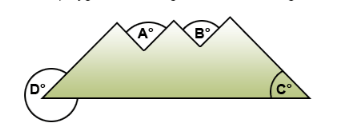
C
Which angle is the exterior angle?
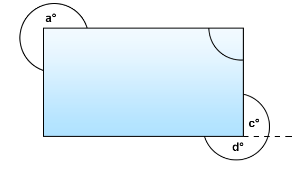
c
What is a+b?
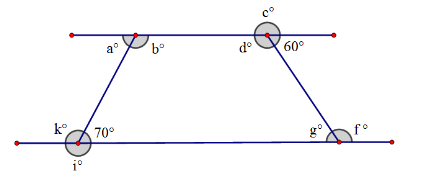
180 degrees
Which term most accurately describes the quadrilateral that has opposite parallel sides but no right angles.
Parallelogram
Name 3 properties of parallelograms
Opposite sides are parallel. Opposite sides are congruent. Opposite angles are congruent. Adjacent angles are supplementary
What is the measure of angle a1?
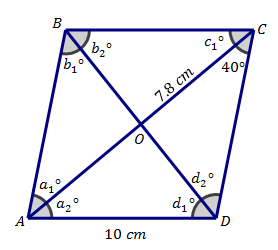
40 degrees by Alt Interior Angles
What is the formula for the sum of the interior angles of a polygon?
180(n-2)
What is the sum of the exterior angles of a convex polygon?
360 degrees
b = 110 degrees, what is the measure of angle g?
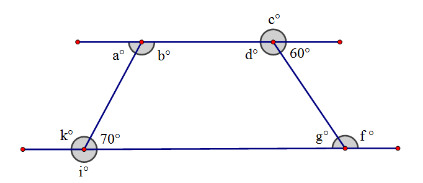
60 degrees by alternate interior angles
(Note: g=110 tells us that our top and bottom sides are parallel, which allows us to use transversal properties)
Name 3 special types of parallelograms
rectangles, rhombi, squares
What is the relationship between angles a and b?
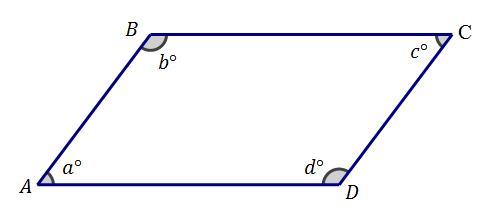
They add to 180 degrees
What is the length of diagonal AC?
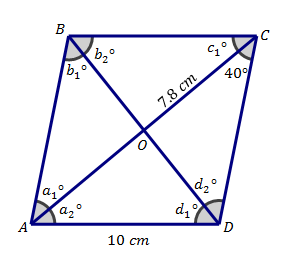
7.8*2 = 15.6
What is the sum of the interior angles of the shape shown below?
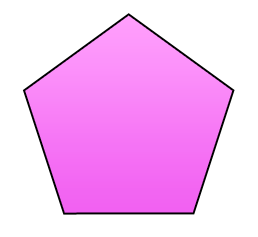
180(n-2) = 180(5-2) = 180(3) = 540
Solve for x
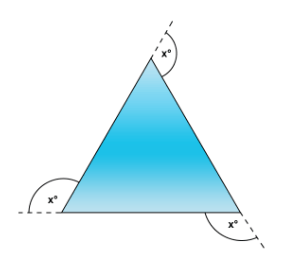
x = 360 divide 3 = 120
What is the sum of k+i?
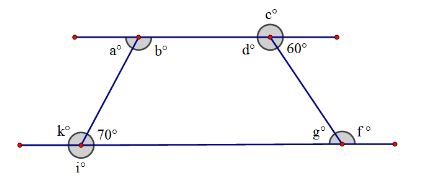
360-70 = 290 degrees
What is the defining characteristic of a kite?
Parallelogram ABCD is a square. The length of side BC = x + 4 and the perimeter of ABCD = 80. What is the length of side BC?
perimiter = 4(x+4) = 4x+16 = 80
4x = 64, x=16.
BC = x+4 = 16+4 = 20
What is the measure of angle L
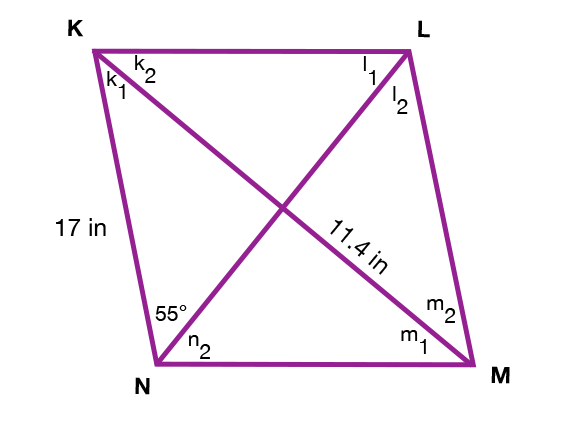
55*2 = 110
What is the sum of the interior angle of a shape with 20 sides?
180(20-2) = 180(18) = 3240
Find the measure of angle r
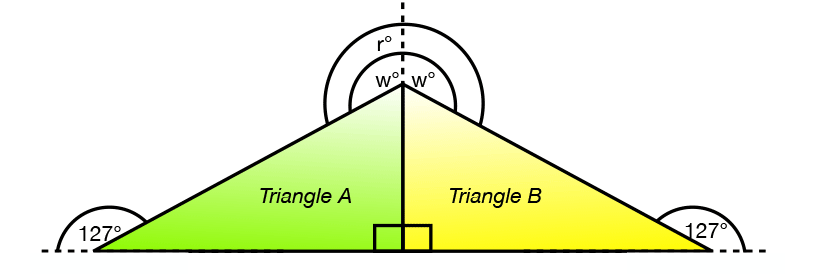
w = 360-90-127 = 143
r = 2w = 286
What is the measure of angle y?
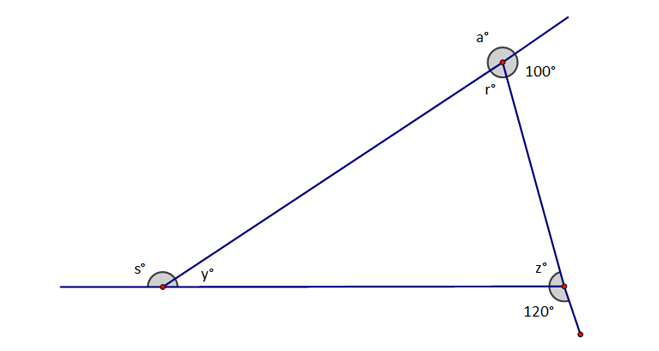
40 degrees
Find the measure of angle B
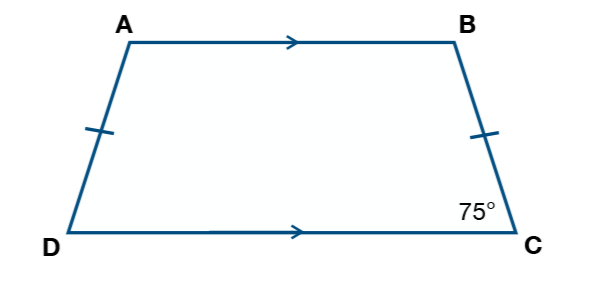
180-75 = 105 degrees
Find the area of the rectangle below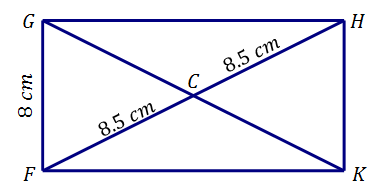
First we find the width using the Pythagorean theorem.
x^2+8^2=17^2
x^2+64 =289
x^2 = 225
x = 15
We now use the length and width to find the area of the rectangle: A = l*w = 15*8 = 120
What is the sum of the interior angles of a decagon?
180(n-2) = 180(10-2) = 180(8) = 1440
Prove that the exterior angles of a quadrilateral sum to 180 degrees.
Take a random quadrilateral ABCD.
All 4 angles of ABCD are made of up a pair of interior and exterior angles that are supplementary.
Let us label the interior angles as a,b,c,d and the exterior angles a',b',c', and d'.
We know that (a+a') = (b+b') = (c+c') = (d+d') = 180. It follows that (a+a')+(b+b')+(c+c')+(d+d') = 4*180 = 720
We can rewrite this sum as a+b+c+d+a'+b'+c'+d'=720
We know that the interior angles of a quadrilateral sum to 360 degrees, so we can substitute 360 in for a+b+c+d, which gives us:
360 + a'+b'+c'+d' = 720
a'+b'+c'+d' = 360.
Since a',b',c',and d' are our exterior angles, and they all add to 360 degrees, our proof is complete.
What is the measure of angle s?
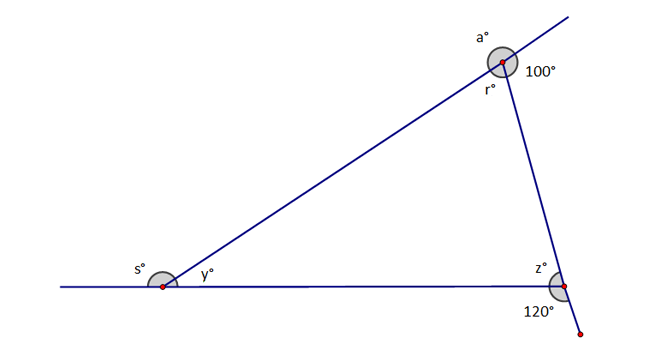
140 degrees
If AD = 3x + 18, AB = 5x + 10, and BC = 12x + 2, what is BC?
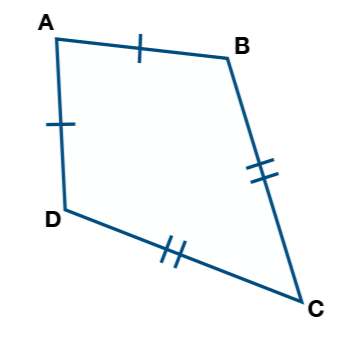
AB = AD, 3x+18 = 5x+10
2x = 8
x=4
BC = 12x+2 = 12(4)+2 = 50
Prove that opposite sides of a parallelogram are congruent.
consider an arbitrary parallelogram.
We know that opposite sides are equal by definition.
We can draw a diagonal that is congruent to itself by the reflexive property.
This gives us two triangles that are congruent by SSS.
This gives us two opposite angles that are congruent by CPCTC